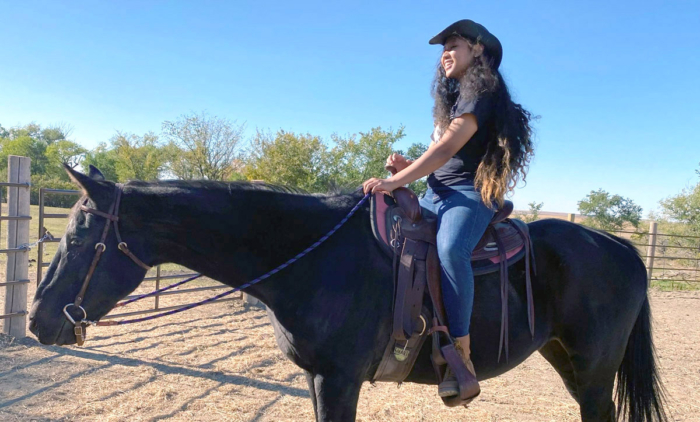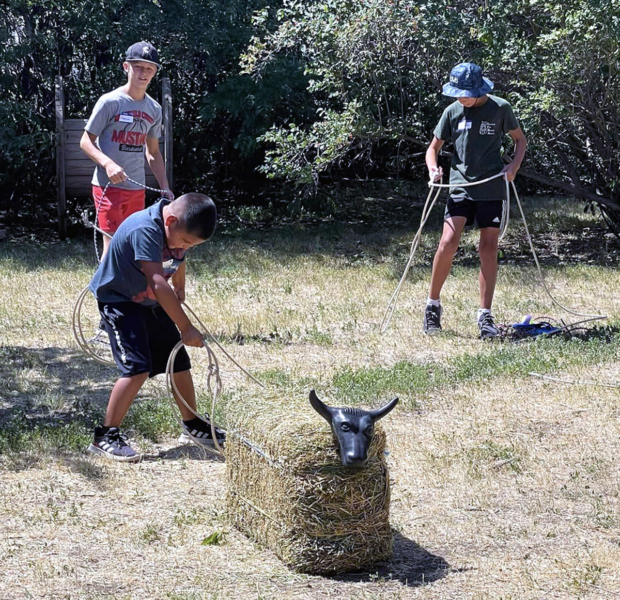South Dakota Episcopal mission ranch brings together Lakota people and horses for connection, healingPosted May 17, 2023 |
|
[Episcopal News Service] On a 20-acre ranch on the Cheyenne River Reservation in northern South Dakota, the Rev. Kurt Huber and the Rev. Ellen Huber have created a ranch where members of the Lakota tribe can connect with horses and their ancient culture to renew their spirit.

A Lakota girl sits on a horse at Black Horse Ranch, part of the Cheyenne River Episcopal Mission in South Dakota. Photo: Facebook/Black Horse Ranch
The Lakota see horses not as companion animals but as relatives and sacred members of the Horse Nation in a relationship called Mitakuye Oyasin – “we all are related.”
In the summer of 2022, the Hubers first offered a summer horse and pony camp, creating an opportunity for Lakota children and teenagers to interact with horses, learn cowboy skills like calf roping, and to make arts and crafts.
The camp was a big hit but came with from a challenge – on a few days, the temperature hit 100 degrees Fahrenheit, making it too hot to safely hold activities outside. The Hubers already had learned that winter temperatures could fall to 35 degrees below zero, Kurt Huber told Episcopal News Service, making it unsafe to offer programs in winter months. The solution was an enclosed arena, but there was a catch, and a big one: They didn’t have the money for it – in fact, the ranch has little funding beyond what the Hubers themselves provide. A $99,541 grant from the United Thank Offering in 2022 has provided almost half the $200,000 needed to build an arena. The Hubers will fundraise the rest of the money needed to start construction, they said.
The Hubers didn’t move from Connecticut to South Dakota in September 2020 with the intention of starting a horse-based ministry. They came because they felt a call to serve the Lakota people and of the Cheyenne River Episcopal Mission. At first South Dakota Bishop Jonathan Folts thought the Hubers were interested in filling a vacancy at a bigger church in Rapid City. When he discovered they were interested in serving the Cheyenne River Reservation mission churches, he was thrilled.
“That was amazing,” Folts told ENS. “We had an opportunity to bring two priests on board” to serve what then were 12 congregations (now there are 10), and to do so without a long gap in clergy leadership, which he said was rare for his diocese. The most recent search for a priest to serve the Pine Ridge Episcopal Mission took an unprecedented 18 months, he said, half the time it historically has taken to find clergy to serve there.
It was the need for a diversity of clergy, including Indigenous clergy, earlier this year that prompted Bexley-Seabury Seminary to create a program that offers an alternative way to meet the requirements for a Master of Divinity degree. Folts said, at the time, the alternative would benefit his diocese, where 54 of its 79 congregations serve people on reservations.

A boy tries to rope a pretend calf during horse and pony camp on Black Horse Ranch in the summer of 2022. Photo: Facebook/Black Horse Ranch
When Folts discussed the job with the Hubers – who are not Native American – he told them he wanted them to do two things: form a working leadership team and love the people. “And they did that in spades,” he said. “[And] they listened, they learned, they ministered to, they ministered with. And this is how the people felt heard, they felt respected, they felt loved.”
The Hubers were aware of the trauma the Lakota and other Indigenous peoples endured, particularly when it became official U.S. government’s policy to remove Native Americans from their ancestral lands to reservations, and later the forced removal of children from their families to attend residential boarding schools designed to erase their culture. They also learned something new – the centuries-old connection between horses and the Lakota tribe and the deep loss they felt when horses were removed from them.
The couple owned horses when they lived in Connecticut, and while there they became interested in equine-facilitated learning. After they arrived in South Dakota they sought out training through Becoming One with the Spirit of the Horse, which follows a culture-based approach to equine therapy and therapeutic horsemanship. Jon Eagle Sr. founded Becoming One with the Spirit of the Horse on the Standing Rock Reservation, which is just to the north of the Cheyenne River Reservation.
Starting with one horse they brought with them, ranch land outside Eagle Butte and their new equine training, they developed three horse-based programs on their property they named Black Horse Ranch. They and now 11 horses and ponies provide the summer youth camp, as well as a year-round equine facilitated learning and an equine wellness program, with the help of local tribal members who work on the ranch’s staff.
Equine facilitated learning isn’t therapy but does provide a therapeutic setting where tribal members, families and groups can learn more about themselves and address specific personal wounds through their interaction with horses, Ellen Huber pointed out. The program also is available for church or group retreats, and those participants will be introduced to Lakota horse culture. The equine wellness program serves people struggling with addiction, through equine-facilitated learning combined with riding instruction and a safe place for recovery meetings.
The programs offered at the Black Horse Ranch complement the Hubers’ ministry to the mission churches on the Cheyenne River Reservation, where they preside at a weekly service at St. John’s in Eagle Butte, occasional services at other congregations and twice-a-month visits to the local nursing home. The ranch’s programs, they said, are part of their calling. They welcome visitors, mission teams and people from across The Episcopal Church who want to come for a retreat. “It’s a ministry of relationships,” Kurt Huber said, “so come, learn, visit” and, Ellen Huber added, “be changed.”
–Melodie Woerman is a freelance writer and former director of communications for the Diocese of Kansas.

Social Menu